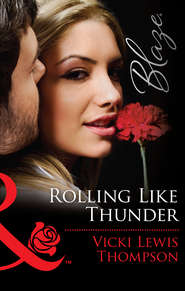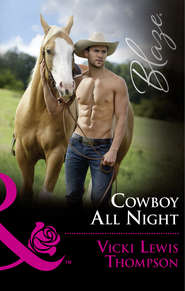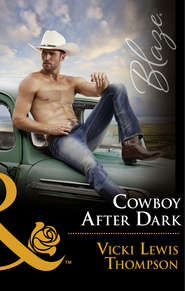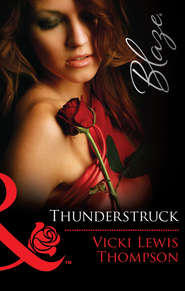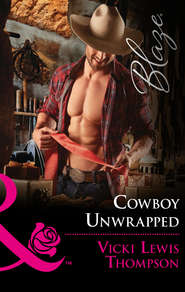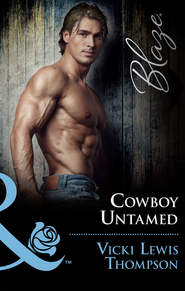По всем вопросам обращайтесь на: info@litportal.ru
(©) 2003-2025.
✖
That's My Baby!
Автор
Год написания книги
2018
Настройки чтения
Размер шрифта
Высота строк
Поля
The butler stepped aside and Nat tried to control his eagerness as he walked forward. These people could lead him to Jess.
Russell P. Franklin, a robust, silver-haired man, rose from a leather wingback in front of the fireplace and came toward him, hand outstretched. Mrs. Russell P. remained seated in her wingback. She strongly resembled Jess, but Nat assumed the red hair was a beauty-salon copy of the color she’d been born with. Still, he couldn’t help thinking that this might be how Jess would look in twenty-five or thirty years. He wanted to be around to see that.
Adele Franklin smiled a greeting, but at the same time she surveyed him carefully. Under her scrutiny Nat remembered how grungy he was in comparison to his hosts. No doubt their sweaters and slacks were everyday casual wear, and they probably cost three times what Nat would spend on his hotel room tonight. Good thing neither Adele nor Russell knew yet that he had designs on their only daughter, or he’d probably be thrown out on his ear.
“Glad to have you stop by, Grady,” Russell said. His handshake was warm and firm. “Come over by the fire. What will you have? A drink, something to eat?”
“Scotch would be great.” Nat didn’t plan to drink much of it, but he’d been a real estate broker long enough to know the value of accepting someone’s hospitality if you wanted to make the sale. This might turn out to be the most important sales call of his life. He would have preferred a beer, but this didn’t look like a beer-drinking household.
“Good.” Russell looked pleased as he signaled to Barclay. “And have the cook rustle up a few sandwiches,” he added. “This man’s been existing on airplane food.”
Airplane food was gourmet fare compared to what the refugees had to eat, Nat thought. But this wasn’t the time to tell them that. “I hope you’ll excuse the way I look.” He stroked his beard. “I came straight from the airport.”
“No excuse necessary,” Russell said. “A man involves himself in a cause such as you have, he doesn’t have time to worry about appearance.”
“It does rearrange your priorities.” Nat sat on a love seat positioned between the two wingbacks and directly in front of the marble fireplace. The stout logs crackled smartly, as if aware of the honor of adding heat and ambience to Franklin Hall.
Windows on either side of the fireplace looked out on the inky flow of the river and the dark shore beyond, where only an occasional light showed signs of civilization. Books, mostly leather-bound, lined the other three walls of the room. There was even a rolling ladder to reach the top shelves.
Adele and Russell each had a book resting on a table beside them, a bookmark inserted in the pages. Then he realized there was no television in the room. Apparently the Franklins still believed in reading as a way to pass an evening.
Nat’s career in real estate had centered primarily on land, but he’d handled a few homes, and some had been real showplaces. None of them equaled this house. The cost of running Franklin Hall for a day would probably feed a refugee family for months.
Adele leaned forward. “You are quite a humanitarian, Mr. Grady. The rest of us may have sent a little money over to help those poor people, but you invested something far more precious—yourself. I commend you.”
Her voice startled him. Jess’s voice. He wanted to close his eyes and savor it. “I don’t really think of it that way, Mrs. Franklin,” he said. “I just had to go.” And not only to escape his demons concerning Jess. That was another thing he needed to settle with his ladylove. If she’d found out about his work in the refugee camps, she probably thought he’d only run away from her. But his decision to help the war-torn country was far more complicated than that.
“Call me Adele,” Jess’s mother said with a warm smile.
Her eyes were gray, not brown like Jess’s. But otherwise she reminded him so strongly of her daughter that he couldn’t stop looking at her. She wove her fingers together in her lap the way Jess did, and when she spoke she wrinkled her forehead slightly, as if putting real thought into what she was about to say. He remembered loving that about Jess.
“By all means,” Russell said. “Let’s not stand on formality.”
At that moment Barclay arrived with Nat’s scotch, a tray of sandwiches, and what looked like mineral water for Adele and Russell.
“Here’s to your dedicated efforts on the part of the refugees,” Russell said, raising his glass toward Nat. He took a swallow and sat back. “Now, why don’t you tell us what you have in mind?”
“I’ll be glad to.” He was passionate and absolutely sincere in his dedication to the war orphans foundation, but he’d used it without remorse as his ticket into Franklin Hall. Once he’d discussed the foundation, he planned to casually mention Jess. He forced his attention away from Adele and concentrated on Jess’s father.
Russell had brown eyes the color of Jess’s. But where her gaze had reminded him of a wild fawn’s, Russell’s could have belonged to George Washington when he led his troops across the Potomac. The man was a fighter and an empire builder. No one who looked carefully into those eyes would underestimate Russell P. Franklin.
Nat thought briefly of his own father. Nobody underestimated Hank Grady, either, least of all his son. Nat especially didn’t underestimate his father’s ability to be cruel. Yet Nat had been fed and clothed. Now he appreciated the luxury of that.
Shutting out the image of his father, Nat carefully outlined his plan for a foundation that would oversee the welfare and possible adoption of the orphaned children he had recently left. He had several potential backers in mind for the project. If Jess had still been living in her apartment, as he’d expected when he’d called from London, he wouldn’t have put Franklin on the list and risked causing Jess problems. But she hadn’t been in her apartment. The phone had been disconnected.
Both Russell and Adele seemed eager to hear the details of his plan, and he realized that getting their support for the foundation was a done deal. He was happy about that, but it wasn’t the most critical part of the interview.
“We’d be honored to have the Franklin Publishing Group be part of that effort,” Russell said when Nat finished. “I’ll talk to my accountants in the morning and see how much of your budget we can cover. Your ideas are well thought out.”
“Thank you.” Nat smiled. “I’ve had a lot of thinking time.”
“Some people could think for years and not come up with a practical scheme,” Russell said. “I appreciate dealing with someone who has a head for business. Philanthropy is a fine thing, but some of these confounded do-gooders quiver at the very idea of fiscal responsibility, and that makes me nervous. It’s too easy to pour money down a rat hole if you don’t have some checks and balances in place.”
“That’s why it was important for me to be over there so long,” Nat said. “I’ve lined up some excellent people who are ready to help run the program.”
Russell nodded and sat back in his chair. “Are you planning to approach other backers about this while you’re in town?”
“Yes, I am. But I wanted to see you first.”
The older man regarded him like a benevolent uncle. “I’m sure you’ll get the backing you need. But I should probably warn you that not everyone is as liberal as I am. You might want to shave.”
“I probably will.” Growing a beard had been practical when hot water and shaving gear had been scarce and cold wind had chapped his bare skin. He’d also blended in better with the refugees, and after a few months, the beard had seemed natural to him. Now that he was back in this country, seeing it in the mirror every day would serve to remind him of his mission. Still, Russell had a point. And then there was the matter of Jess. She had very tender skin….
“I rather like your beard,” Adele said.
“Yes, but you’re not a conservative businessman, Adele,” Russell said. “Some of these fellows get suspicious if they see a lot of facial hair. A mustache, now that’s no big deal, but a full beard conjures up the idea of radicals and hippies, y’know. It could affect whether Nat can get them to turn loose of their money.”
“I understand,” Nat said. “Besides, I might give my secretary a heart attack if I walked into the office looking like this.”
“You sell mostly unimproved land out there in Colorado, don’t you?” Russell said.
“That’s right.” Nat spied an opening. “Have you ever visited the state?”
“No, I never have. Flown over it many times, but never did stop. Pretty country, I understand.”
“It is that.” Nat thought he saw a flicker of emotion in those brown eyes. Adele gazed down at the fingers she’d laced tightly in her lap. Nat waited to see if either of them would mention that they had a daughter living in Colorado. Neither of them did. He’d have to plow this furrow on his own.
His pulse rate spiked. This was undoubtedly a touchy subject, but he didn’t intend to leave without getting into it. “Unless I’m mistaken, your daughter, Jessica, lived in Aspen for a while.”
The atmosphere in the room changed immediately. The camaraderie disappeared as Adele and Russell tensed and looked uneasily at each other. Finally Adele gave an almost imperceptible nod, as if to let her husband handle the comment.
“And how would you happen to have come by that information?” Russell asked. His question was quietly phrased, but the tone was one of command.
“I met her.”
They regarded him in stony silence.
Nat forged on. “But I’ve lost touch with her. I tried calling her from London and found out the number I had for her isn’t good anymore. I thought you might be able to tell me where she is,” he finished, matching his tone to Franklin’s as he met his gaze.
Russell had not changed position in his chair, but somehow he seemed bigger, more formidable. The publishing tycoon had replaced the affable philanthropist. “What is she to you?” he demanded.
“She saved my life.”
Adele gasped.
“And exactly how did she do that?” Russell asked. A muscle twitched in his jaw.
Nat had wondered if she’d ever mentioned the incident to her parents. “She might have told you about helping four clueless cowboys who’d decided to go skiing,” he ventured.






